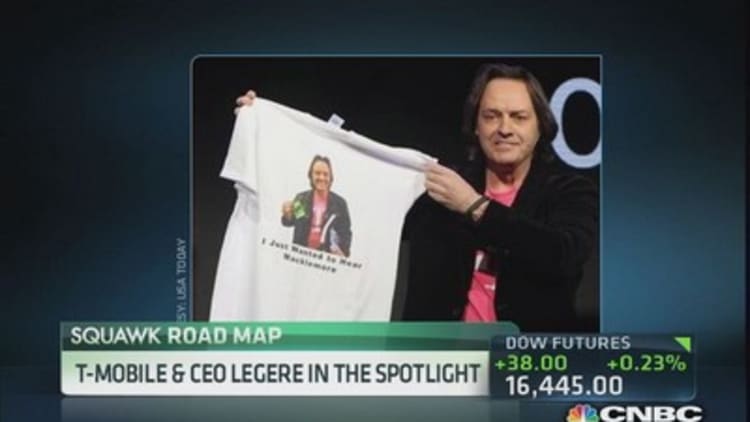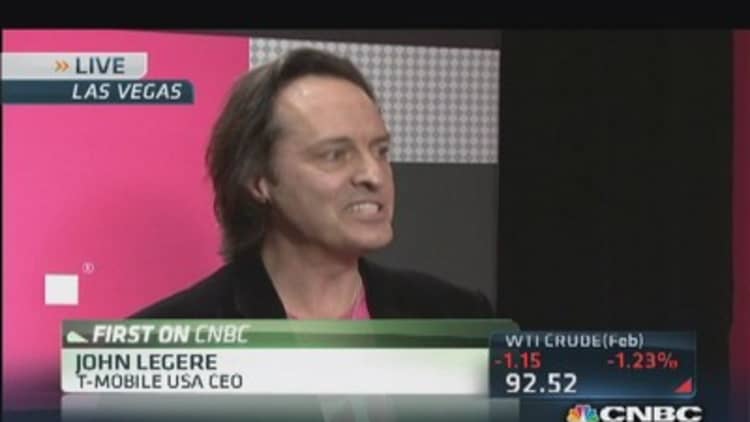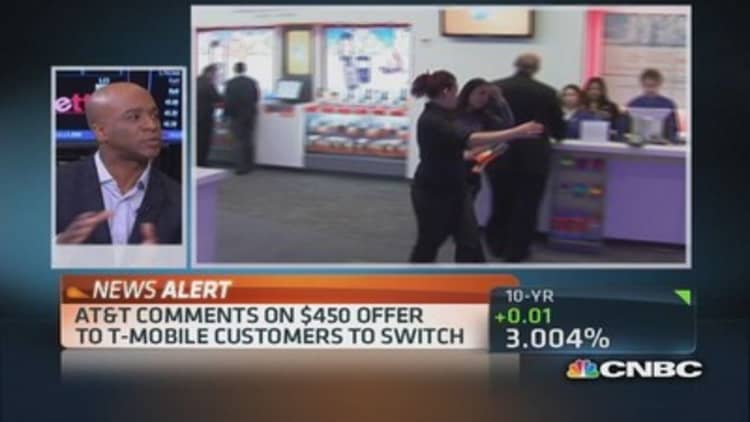
A tug of war has broken out among the major wireless carriers.
As Americans rely more on their mobile devices, guzzling data along the way, the carriers are aggressively wooing new customers.
In perhaps the most daring move yet, T-Mobile US, the country's No. 4 carrier, announced on Wednesday that it would cover the termination fees for individuals as well as up to five lines per family for consumers who leave their carrier. Customers can receive up to $650 in credit after trading in their phone.
It is the latest in a series of moves the company has made to gain customers, helping T-Mobile stand out among competitors whose offerings have largely remained the same — two-year contracts, complex family plans and stiff early-termination fees.
(Read more: T-Mobile to pay termination fees, reports customer growth)
The industry is "just broken," John Legere, T-Mobile's chief executive, said at a news conference on Wednesday. He added: "What we are going to do is force the industry to get healthier."
So far, T-Mobile has found some success, and it has the other carriers in somewhat of a defensive crouch. In August, T-Mobile achieved its highest customer growth numbers in four years, and its momentum continued through the rest of the year.
Clearly, AT&T views T-Mobile as a threat. In the face of rumors that T-Mobile would offer to cover termination fees, AT&T said last week that it would give credit specifically to T-Mobile customers who switched.
Sprint has lowered the cost of its unlimited data plan. And Verizon offered a payment plan similar to one offered by T-Mobile, in which customers can pay monthly installments for a smartphone.
Although T-Mobile seems to be chipping away at its top competitors, it remains unlikely that the company will catch up anytime soon to AT&T or Verizon. The turnover rate at the carriers has been low for many years. And given their size — AT&T (No. 2) and Verizon (No. 1) account for about two-thirds of overall subscribers in the country — it could take longer for the needle to move.
(Read more: T-Mobile CEOon Being Thrown Out of AT&T's party)
One reason for the low turnover rate is that people have contracts that, at least until now, they have usually had to pay to break. Another reason is that changing carriers can be a headache and the upsides are not always clear, particularly for family and business groups. In the past, AT&T executives have told investors that family plans and corporate plans were the key to maintaining customer loyalty, because migrating multiple devices to a different phone carrier was difficult.

"Customers tell me repeatedly, I love what you're doing, I wish I could switch, but I'm handcuffed," Mr. Legere said.
Verizon's and AT&T's high-speed networks also cover more places than those of T-Mobile and Sprint, the No. 3 carrier. But cracks have started to appear in Verizon's network, long the envy of the industry.
The increased demand for data by consumers has led to reports of slower service in some major metro areas.
Although the turnover rate has been relatively low, many consumers have made the carriers a regular source of derision. In a business conference last year, Daniel Hesse, chief executive of Sprint, cited a survey that found that the reputation of wireless carriers had dropped to the lowest level among any major industry.
"Even the cable and oil industries rated higher than we do," he lamented then.
Mr. Legere of T-Mobile has said that he is on a mission to change that.
Last year, the company eliminated the charges that customers normally paid to use their phone numbers and data services in a foreign country, called roaming fees. T-Mobile also shifted from requiring customers to sign two-year contracts, and it offered an option for customers to upgrade to a new phone after as little as six months, instead of waiting two years.
For T-Mobile's termination fee program, each person can receive up to $650 in credit. To get the customer credit, T-Mobile customers must trade in their own smartphone for up to $300 in credit, depending on the phone and its condition. Then they will receive $350 for each line that incurred a termination fee.
(Read more: T-Mobile CEO shrugsoff AT&T's bid to swipe customers)
Customers will have to show proof that they left a carrier and had to pay an early termination fee. Customers of AT&T, Sprint and Verizon Wireless are eligible for the credit.
Jan Dawson, a telecom analyst for Jackdaw Research, said the move was clearly removing one of the big barriers for people to switch to T-Mobile.
"It's a pretty low-risk thing to do — switch to T-Mobile, get a bunch of money for your devices, and then switch back if you don't like it," he said.
"It's a smart move and one that will likely perpetuate T-Mobile's momentum for another few months."
Some analysts say they think T-Mobile is trying to quickly gain customers to set itself up for a sale. Rumors have swirled that Sprint is interested in acquiring T-Mobile, which raises questions about whether T-Mobile's offerings could be taken away under a new owner.
During an interview session with journalists at T-Mobile's conference, Mr. Legere did not dismiss the rumor of such a bid and said, "What I can tell you is the T-Mobile Un-carrier business — the people, the attitude and the brand — is here to stay."

So far, much of the sparring among the carriers has been between AT&T and T-Mobile. But just a few years ago, AT&T tried to buy T-Mobile, which would have made AT&T the largest cellphone service provider.
That effort ended when AT&T could not overcome stiff opposition by the Obama administration, which had raised antitrust concerns.
Now, the tension between the companies is even getting a bit personal.
This week, Mr. Legere showed up at an AT&T party at the International CES, a trade show in Las Vegas.
(Read more: )
AT&T, alerted to his presence by social media, had him removed from the event.
"Do you think it's evidence that we, including me, have gotten under their skin?" Mr. Legere said in an interview on Wednesday.
—By Brian X. Chen of The New York Times

